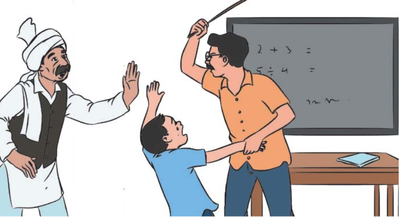Corporal punishment
Corporal punishment
Introduction
Many people in the villages agree with the adage, ‘spare the rod and spoil the child’. They believe a child needs to be physically punished in order to be disciplined. But that is not the case. Physical punishment meted out to children in order to discipline them is the most ineffective way. On the contrary, children get emotionally affected and end up with feelings of hate for the person assaulting them.

What the law says about corporal punishment for children
Although India does not have many laws to prevent parents from giving corporal punishment to children, but some states like Goa, Tamil Nadu, West Bengal, Andhra Pradesh etc. have issued a ban on corporal punishment in schools.
Role of panchayat members in stopping corporal punishment
Panchayat members should set an example by stopping corporal punishment in their own homes and motivate others to do the same. They should oppose corporal punishment in their village schools. If these issues come out in public, the panchayat members should raise them by means of discussions in Gram Sabha meetings and encourage Village Education Committees (VECs) to prohibit use of corporal punishment in schools.
Source : NCPCR handbook on Safe Childhood Programme for Panchayat members
जोबथा दाफामनाय : 7/1/2024
The Article provides information about Antioxidant...
This topic deals with information related to Anxie...
This topic provides information about 20th Livesto...
This topic deals with information related to Appen...
